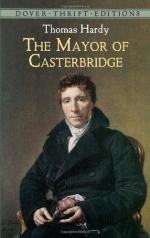They searched Egdon, but found no Henchard. Farfrae drove onward, and by the afternoon reached the neighbourhood of some extension of the heath to the north of Anglebury, a prominent feature of which, in the form of a blasted clump of firs on a summit of a hill, they soon passed under. That the road they were following had, up to this point, been Henchard’s track on foot they were pretty certain; but the ramifications which now began to reveal themselves in the route made further progress in the right direction a matter of pure guess-work, and Donald strongly advised his wife to give up the search in person, and trust to other means for obtaining news of her stepfather. They were now a score of miles at least from home, but, by resting the horse for a couple of hours at a village they had just traversed, it would be possible to get back to Casterbridge that same day, while to go much further afield would reduce them to the necessity of camping out for the night, “and that will make a hole in a sovereign,” said Farfrae. She pondered the position, and agreed with him.
He accordingly drew rein, but before reversing their direction paused a moment and looked vaguely round upon the wide country which the elevated position disclosed. While they looked a solitary human form came from under the clump of trees, and crossed ahead of them. The person was some labourer; his gait was shambling, his regard fixed in front of him as absolutely as if he wore blinkers; and in his hand he carried a few sticks. Having crossed the road he descended into a ravine, where a cottage revealed itself, which he entered.
“If it were not so far away from Casterbridge I should say that must be poor Whittle. ’Tis just like him,” observed Elizabeth-Jane.
“And it may be Whittle, for he’s never been to the yard these three weeks, going away without saying any word at all; and I owing him for two days’ work, without knowing who to pay it to.”
The possibility led them to alight, and at least make an inquiry at the cottage. Farfrae hitched the reins to the gate-post, and they approached what was of humble dwellings surely the humblest. The walls, built of kneaded clay originally faced with a trowel, had been worn by years of rain-washings to a lumpy crumbling surface, channelled and sunken from its plane, its gray rents held together here and there by a leafy strap of ivy which could scarcely find substance enough for the purpose. The rafters were sunken, and the thatch of the roof in ragged holes. Leaves from the fence had been blown into the corners of the doorway, and lay there undisturbed. The door was ajar; Farfrae knocked; and he who stood before them was Whittle, as they had conjectured.
His face showed marks of deep sadness, his eyes lighting on them with an unfocused gaze; and he still held in his hand the few sticks he had been out to gather. As soon as he recognized them he started.
“What, Abel Whittle; is it that ye are heere?” said Farfrae.




